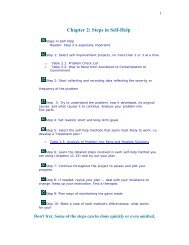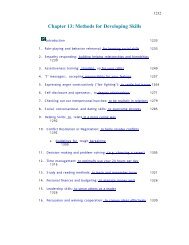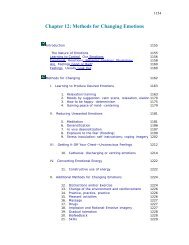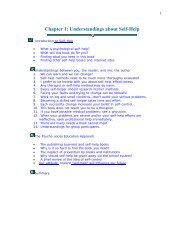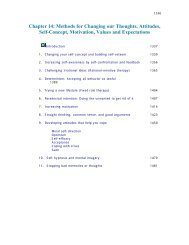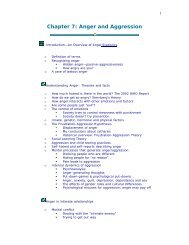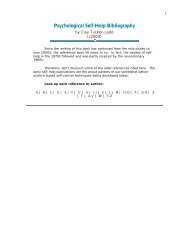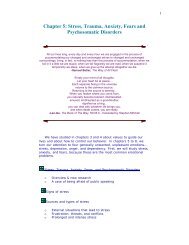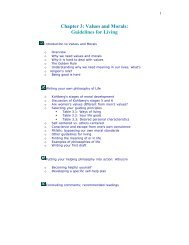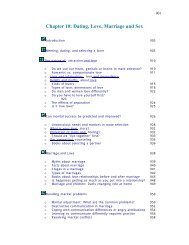Methods for Changing Behaviors - Psychological Self-Help
Methods for Changing Behaviors - Psychological Self-Help
Methods for Changing Behaviors - Psychological Self-Help
Create successful ePaper yourself
Turn your PDF publications into a flip-book with our unique Google optimized e-Paper software.
(because hard work would have been well rewarded and, thus, would<br />
have become rewarding itself). Un<strong>for</strong>tunately, perhaps, sometimes life<br />
is easy and the law of least ef<strong>for</strong>t is operating. When people have been<br />
able to get what they want without much ef<strong>for</strong>t, they haven't learned<br />
to work hard, i.e. be motivated, nor have they learned to tolerate<br />
tedium or the "stench and grime" of hard conditions. As an old farmer<br />
might say, "They haven't <strong>for</strong>ked manure or dug post holes in hard<br />
ground, yet."<br />
Learned helplessness is the hopeless attitude of the pessimist or<br />
the depressed person. Such a person is unmotivated (see chapter 6).<br />
"Learned industriousness " is the opposite notion, namely, that hard<br />
work that has paid off results in higher motivation and less aversion to<br />
unpleasant but unavoidable work situations (Eisenberger, 1992). How<br />
do you learn to be industrious?<br />
You need some confidence in your ability to do the job (see selfefficacy<br />
in chapter 14) but this doesn't explain great perseverance on<br />
simple, tedious, and boring tasks. Clearly, you also need to be able to<br />
handle--to tolerate--the aversiveness of hard work and bad conditions<br />
when they are part of getting to your goals. The rein<strong>for</strong>cement of high<br />
ef<strong>for</strong>t (worthwhile extrinsic and intrinsic pay offs) on a variety of tasks<br />
seems to accomplish both, i.e. strengthens our general tendency to try<br />
hard and to "stick it out" though rough times. The childhood histories<br />
of motivated workers bear this out; they were highly rewarded <strong>for</strong><br />
trying hard. That's how the "work ethic" is created. If you were left out<br />
of that process, you can still teach yourself the merits of intense ef<strong>for</strong>t.<br />
"Ef<strong>for</strong>t training" consists of rein<strong>for</strong>cing hard, serious trying on many<br />
tasks over a long period of time. There is evidence that such training<br />
even increases our motivation on enjoyable tasks (perhaps because all<br />
tasks and subjects have their dull and difficult parts).<br />
You will have to select your own tasks to try hard on and to reward<br />
well (see methods #15 & #16). While research has shown that<br />
industriousness generalizes well from one task to another, it is not<br />
known how far it generalizes. Thus, if I wanted to be more motivated<br />
to study hard, I wouldn't just do my "ef<strong>for</strong>t training" in an exercise<br />
program or in a sport, although that might be helpful. I'd write a hell<br />
of a English theme paper, trying to enjoy it as well as giving myself<br />
rewards (plus a good grade). Then I'd take on Calculus or Geography<br />
intending to do outstanding work (again with satisfaction and<br />
rewards). Followed by, a proud, concerted ef<strong>for</strong>t to make the next<br />
Dean's list, etc.<br />
Opportunity is missed by most people because it is dressed in overalls and looks like<br />
work.<br />
-Thomas Edison<br />
1091



